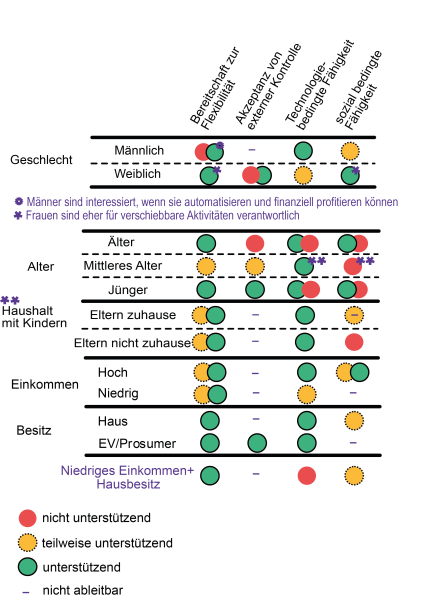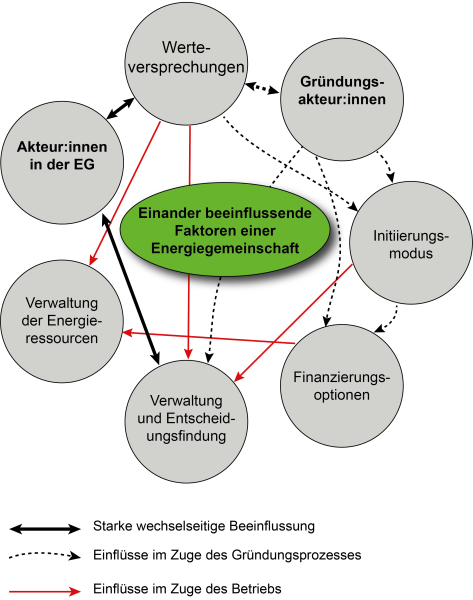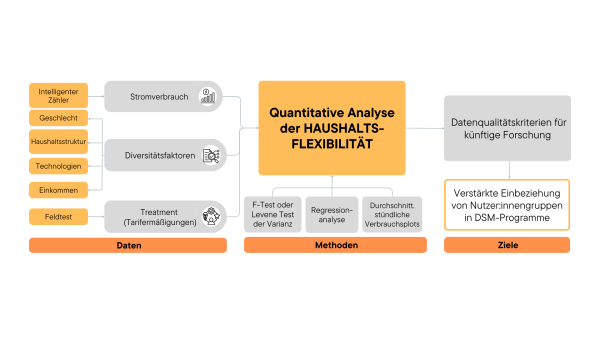IEA UsersTCP SLA 2.0: Inclusive and Community-Oriented Approaches to a Social License to Automate (Working period 2022-2024)
Short Description
The IEA UsersTCP SLA 2.0' (SLA2.0) project focused on the following objective:
- Understand the role of gender and diversity factors in energy consumption flexibility and identify appropriate engagement approaches
- Map the contribution potential of energy communities and other collaborative efforts to promote a social license to automate
- Define markers of consumption flexibility based on load profiles and derive data quality criteria
The findings on gender and diversity aspects of flexibility revealed that men and women have different skills and barriers to implementing flexibility. Men tend to focus more on technological and financial aspects, while women are more environmentally or socially motivated. Families with children showed increased willingness but faced time-related challenges. Households with higher incomes, particularly those owning homes and prosumer technologies, demonstrated a notably higher willingness and ability to participate. These insights were translated into a flexibility framework.
The analysis of energy community characteristics and their potential to support a social license identified seven key dimensions, which were used to develop a typology. The case study analysis revealed that energy justice within energy communities primarily relates to distributive justice. Social capital, particularly through training and job creation, as well as political support, are critical to the success of energy communities. Additionally, community empowerment and direct participation significantly enhance social acceptance.
The load profile analysis to identify flexibility markers showed that men tend to have higher baseline consumption, while women exhibit higher peaks in winter. Younger households and those with higher incomes generally displayed higher peak consumption, while households with children or more members had earlier peak times. Technologies such as heat pumps and solar PV systems influenced consumption patterns, with heat pumps causing higher consumption at night and solar PV during the day.
Based on these findings, the concept of flexibility readiness was defined using the dimensions of capacity, capability, and willingness. This was categorized into three flexibility readiness levels (low, medium, high) and described through associated intersectional diversity profiles. Derived recommendations for inclusive Demand Side Management (DSM) include low-tech solutions, digital education offerings, household-wide education initiatives, and support for low-income households through subsidies. Inclusive energy communities require simplified participation processes and the inclusion of local stakeholders. Comprehensive data collection is also essential for developing more targeted participation opportunities.
Project Images
Terms of use: The pictures listed underneath the header “Project Pictures” originate from the projects in the frame of the programmes City of Tomorrow, Building of Tomorrow and the IEA Research Cooperation. They may be used credited for non-commercial purposes under the Creative Commons License Attribution-NonCommercial (CC BY-NC).
Project Partners
Project leader
Lisa Diamond
AIT Austrian Institute of Technology
Giefinggasse 4, 1210 Vienna
lisa.diamond@ait.ac.at
Project partners
Diotima Bertel
AIT Austrian Institute of Technology
Giefinggasse 4, 1210 Wien
E-Mail: diotima.bertel@ait.ac.at
Giulia Garzon, MSc
Andrea Kollmann
Benjamin Kirchler, MSc
Energieinstitut an der Johannes-Kepler-Universität Linz
Altenberger Straße 69, 4040 Linz
E-Mail: garzon@energieinstitut-linz.at; kollmann@energieinstitut-linz.at; kirchler@energieinstitut-linz.at
Constanze Frech, MEng.
Mélanie Michel, MSc.
Fachhochschule Technikum Wien
Höchstädtplatz 6, 1200 Wien
E-Mail: constanze.frech@technikum-wien.at; melanie.michel@techikum-wien.at
Participants
Austria (Operating Agent), Ireland, Netherlands, Norway, Sweden, Switzerland



